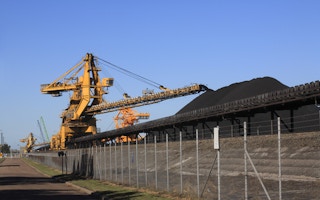Coal mining companies in Australia have been enjoying the good life in recent years, making millions of dollars from feeding the seemingly insatiable energy appetites of Asia’s tiger economies – particularly that of China.
But a new report by the Smith School of Enterprise and the Environment (SSEE) at Oxford in the UK warns that Australia’s coal mining party could be coming to an end.
It says coal demand in China looks likely to fall in the years ahead due to concerns about climate change and other factors, leaving billions of dollars of investments in Australian coal mining projects in jeopardy.
The report, Stranded Down Under, details the considerable growth of Australia’s coal production in recent years. Coal has been one of the main reasons behind the continuing health of the country’s economy – it now accounts for 16% of the total value of exports.
Producers want to increase output from the present level of around 440 million tonnes per year to 550 million tonnes by 2020, the main part of production going for export.
Altogether investments of AU$100bn (US$90bn) involving 89 projects are planned over the next 15 years according to Australia’s federal Bureau of Resources and Energy Economics (BREE).
Water running short
The conservative Coalition government led by Tony Abbott, elected to office earlier this year, is rolling back taxes and environmental regulations in order to encourage mining investments.
The report says weakening global coal prices, plus a likely decline in coal demand in China – by far Australia’s biggest export market – make the outlook for these projects very uncertain.
“Demand below expectations – and lower coal prices as a result – would increase the risk that coal mines, reserves and coal-related infrastructure could become mothballed or abandoned.”
At present China accounts for half the world’s coal consumption: it imports more than 30% of its annual needs from Australia.
The report says concerns about the environment and the chronic air pollution experienced by many cities in China will lessen the role of coal in the country’s energy mix. Coal needs a lot of water – whether for “washing” or for driving steam turbines.
“Increasing water scarcity could also adversely impact coal demand, while domestic shale gas and changing international gas markets will result in more coal-to-gas switching.”
Ignoring reality
The study points out that China is investing heavily in renewables and has made clear in the present four-year plan its commitment to increasing energy efficiency and developing alternative non-fossil fuel supplies.
The authorities in Beijing have also introduced carbon pricing and trading, with the first emissions trading scheme implemented in the southern city of Shenzhen in mid-2013.
All this is likely to have a significant impact on Australia’s coal exporting industry. Yet, says the report, owners and operators of the country’s coal assets are, for the most part, ignoring what’s going on.
Any slowing of coal demand from China will have a big impact on both federal and state government finances. The state of Queensland alone – the site of many of the biggest mining projects – is paid more than AU$3bn (US$2.7bn) each year in royalties by the mining conglomerates.
The report points out that the warning signs for what is one of Australia’s biggest industries are already there: in recent months thousands of workers in the sector have been laid off and a number of projects have been suspended.
Coal is by far the most polluting of fossil fuels, contributing hundreds of thousands of tonnes of CO2 to the atmosphere each year and so increasing global warming. On a per capita basis, Australia has among the highest CO2 emissions in the world.










